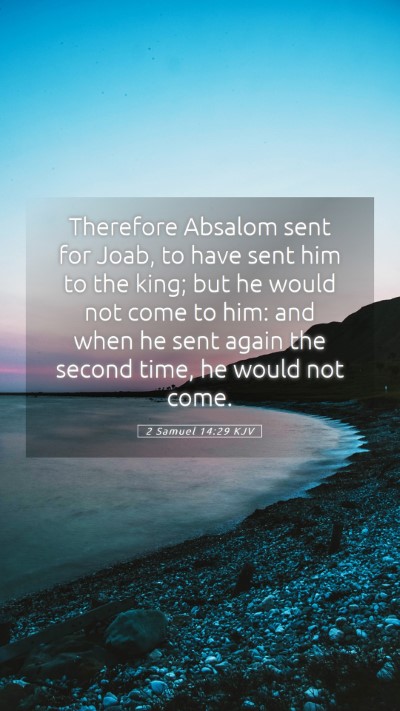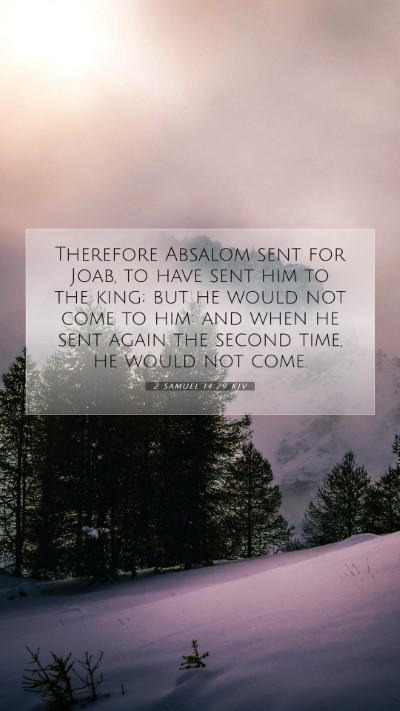Understanding 2 Samuel 14:29
2 Samuel 14:29 says, "And Absalom sent for Joab, to have him sent to the king; but he would not come to him: and when he sent again the second time, he would not come." This verse captures a pivotal moment in the narrative of Absalom's return to Jerusalem, highlighting themes of rejection, unresolved tension, and the complexities of relationships within the royal court.
Bible Verse Meanings
This verse intricately weaves together the dynamics of authority and influence, particularly as it pertains to Absalom's attempts to reintegrate into his father's kingdom after a period of estrangement resulting from his actions. The rejection of Joab serves as a significant marker of the conflict brewing within David's family and his court.
Commentary Insights
- Matthew Henry's Commentary: Matthew Henry emphasizes the emotional turmoil surrounding Absalom's desire for reconciliation with his father, King David. He points out Absalom’s determined nature in seeking Joab's assistance, reflecting his desperation and the pride that prevents him from approaching his father directly.
- Albert Barnes' Notes: Albert Barnes contextualizes Joab's refusal to come to Absalom, suggesting it symbolizes deeper political and social tensions in the kingdom. He notes that Joab, as a military commander, is both a significant ally and a figure who navigates the complexities of loyalty, strategic alliances, and influence within the court.
- Adam Clarke's Commentary: Adam Clarke focuses on the implications of Joab's disdain for Absalom’s demands. He interprets it as an indication of Joab’s awareness of the broader implications of Absalom's actions and intentions - suggesting that Joab's refusal may stem from his own political calculations regarding the stability of the realm under David's rule.
Scripture Analysis
Through an analysis of this verse, one can observe how personal relationships in biblical narratives often reflect larger themes of power, trust, and redemption. The refusal of Joab to engage with Absalom symbolizes a fragmented relationship within David's family and his administration, urging the reader to explore the notions of loyalty and betrayal. It also foreshadows the tragic trajectory that Absalom's ambitions will take.
Historical Context
The context of this passage is rooted in the earlier events surrounding Absalom's rebellion and the murder of his brother Amnon. Absalom's actions had forced him into exile, and Joab's earlier role in orchestrating Absalom's return sets the stage for this interaction. Understanding the historical context of these familial tensions is essential for a comprehensive interpretation of the dynamics at play.
Application of 2 Samuel 14:29
This verse can serve as a reflection on our own relationships and the importance of communication and reconciliation. Just as Absalom sought Joab’s intervention, we too may find ourselves in situations where we need to navigate complex relationships carefully, balancing pride and humility for the sake of restoration and peace.
Related Bible Verses
- 2 Samuel 13:28-29: The context of Amnon's death, setting the stage for Absalom's estrangement.
- 2 Samuel 14:1-3: Joab's initial orchestration of Absalom's return.
- 1 Kings 1:5-7: The rising tensions as Absalom seeks to establish himself against his father, King David.
- Proverbs 16:18: "Pride goes before destruction, a haughty spirit before a fall." This verse relates to the consequences of Absalom’s pride and ambition.
Bible Study Insights
Those studying this verse may find it valuable to consider the wider implications of themes such as leadership, authority, and family dynamics in the biblical narrative. Using Bible study tools to dive into commentaries, historical context, and thematic explorations can lead to a deepened understanding of not only this passage but also its application in our daily lives and relationships.
Final Thoughts
Through the lens of biblical exegesis, 2 Samuel 14:29 serves as a reminder that the stories within Scripture often reflect the experiences of human relationships and the challenges faced therein. Engaging with such verses allows believers and seekers alike to explore their meanings, applications, and relevance in contemporary life.


